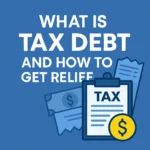Not filing your taxes for a single year is serious—but letting it go for five years? That raises red flags and comes with major consequences. The IRS considers failure to file a federal tax return a legal issue, not just a financial oversight. If you owe taxes and never file, the problem does not disappear over time—it gets worse.
The IRS can file what is known as a Substitute for Return on your behalf using income records from employers, banks, or clients. This version will not include any deductions or credits you may be entitled to, which means you will likely owe much more than you actually should. Once that substitute return is processed, the IRS will start collection efforts. This could include wage garnishments, bank levies, and tax liens placed on your property.
On top of the tax bill, penalties and interest add up fast. The Failure to File Penalty alone is 5 percent of the unpaid taxes per month, up to 25 percent. Add the Failure to Pay Penalty and daily interest, and your original debt can double over time. You also risk losing refunds from any year you did not file, because the IRS only allows you to claim them for up to three years.
After five years, you are not just dealing with debt—you are risking enforcement, asset seizures, and even criminal charges in extreme cases. The smartest move is to get ahead of it. A tax professional or attorney can help you gather documents, file past-due returns, negotiate with the IRS, and stop collections before they escalate. It is never too late to fix it—but the longer you wait, the fewer options you will have.
Who Qualifies for the IRS Fresh Start Program?
The IRS Fresh Start Program is not a single program, but a set of expanded tax relief options designed to help struggling taxpayers get back on track without facing aggressive collections. If you owe back taxes and are overwhelmed by penalties or payment demands, this program could give you a second chance to resolve your debt on manageable terms.
To qualify for the Fresh Start initiative, you need to show that you cannot reasonably pay your tax balance in full without causing serious financial hardship. That does not mean you must be broke, but the IRS will closely evaluate your income, expenses, and assets. Individuals who owe fifty thousand dollars or less and small business owners who owe twenty five thousand dollars or less are generally eligible to apply.
There are several key parts of the Fresh Start Program:
- Installment Agreements with relaxed qualifications and streamlined approvals
- Offer in Compromise to settle tax debt for less than the full amount owed
- Tax lien withdrawal if you set up a direct debit installment agreement
- Penalty relief for qualifying taxpayers who were unable to pay due to hardship
Even if you do not meet all the requirements perfectly, you may still be eligible under updated guidelines or by working with a tax professional to structure your request. If you are behind on taxes and want to avoid levies, garnishments, or long term damage to your financial future, the Fresh Start Program may be the opportunity you need to reset your situation with the IRS.

Will the IRS Settle for Less Than I Owe?
Yes, the IRS can settle your tax debt for less than the full amount—but only if you qualify for a program called an Offer in Compromise. This is not a loophole or a negotiation tactic. It is a formal IRS option designed for people who genuinely cannot afford to pay their full debt without experiencing significant financial hardship.
To qualify, the IRS reviews your income, expenses, assets, and future earning potential. They want to know what you could reasonably afford to pay, not just what you owe. If the amount they believe they can collect is less than your total tax debt, they may agree to settle. For example, someone who owes forty thousand dollars but earns under thirty thousand per year and has no significant assets might qualify for a reduced settlement.
To apply, you must be current on all required tax filings and not be in bankruptcy. You’ll also need to submit documentation, pay a nonrefundable application fee, and usually include a portion of your proposed settlement amount. If the IRS accepts your offer, you must stay compliant with all tax obligations for the next five years or the deal could be revoked.Even if you don’t qualify for an Offer in Compromise, there are still options like payment plans, hardship deferral, or penalty relief. If you’re unsure whether you meet the criteria, it’s worth speaking with a tax attorney or licensed professional. They can assess your eligibility and help you avoid wasting time or worsening your situation.

Why Hiring a Tax Attorney Is in Your Favor
When you are dealing with serious tax issues, whether it is a growing debt, an audit, or a letter from the IRS, there is a big difference between researching online and having a trained legal expert in your corner. A tax attorney is more than someone who understands tax law. They know how to protect your rights, minimize damage, and take strategic steps that work in your favor.
Unlike accountants or tax preparers, tax attorneys are licensed legal professionals who can represent you before the IRS and in court. They handle complex cases like audits, wage garnishments, bank levies, tax liens, and fraud investigations. One major advantage is attorney client privilege, you can share every detail with full confidentiality, knowing it cannot be used against you.
A tax attorney can help you apply for relief options such as payment plans, Offers in Compromise, penalty reductions, and hardship status. If you are at risk of collections or criminal charges, they can act quickly and legally to pause enforcement or negotiate a better outcome. Their job is to focus on the details while keeping you legally protected and financially stable.
You would not walk into court without a lawyer, so why face the IRS alone? Hiring a tax attorney is not just smart—it is strategic. If your tax problems feel too big to handle, having the right legal help on your side could be the turning point between stress and resolution.

What Is a CP30 Notice?
A CP30 Notice is a formal letter from the IRS that tells you a penalty has been added to your account because you did not pay enough in estimated taxes throughout the year. Even if you filed your tax return correctly and on time, the IRS can still issue a CP30 if your total payments fell short of what you owed. This notice often comes as a surprise, especially to people who are self employed or receive income without tax withholding.
The IRS expects taxpayers to pay taxes as income is earned, not just at the end of the year. If you do not have enough withheld from your paycheck or do not make quarterly estimated tax payments when required, you may be penalized. The CP30 Notice outlines the amount of the penalty and may include interest charges as well. It does not mean you are being audited—it simply means the IRS believes you underpaid during the year.
There are many reasons you might receive a CP30. A common one is when a taxpayer earns freelance or business income but does not send in estimated payments. Others get this notice when they have a one time increase in income, like a bonus or stock sale, that pushes their tax bill higher than expected. Whatever the reason, the CP30 is your official heads up that the IRS has assessed a penalty.If you think the penalty was issued in error or you had a valid reason for not paying enough, you may be able to request penalty relief. The IRS offers First Time Penalty Abatement or other relief options for taxpayers with a clean history or special circumstances. A tax professional or attorney can help you review the notice, respond properly, and avoid similar issues in the future.


